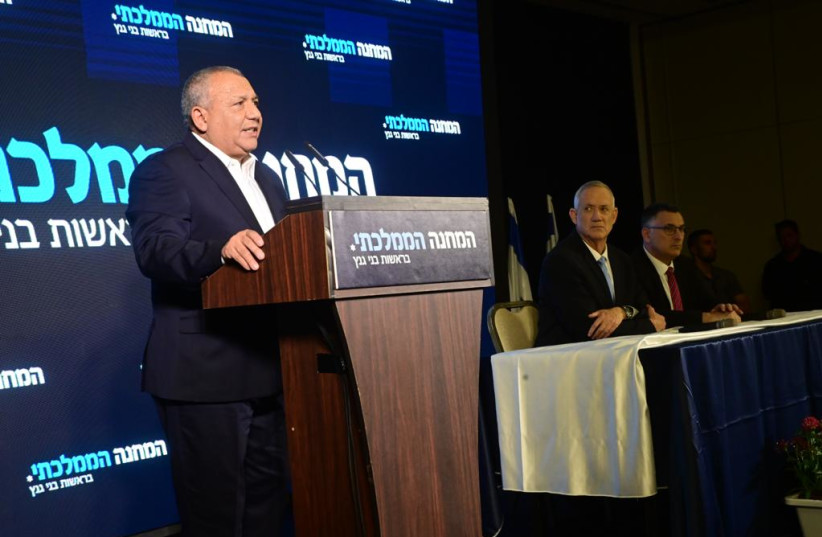In a seemingly intractable political maelstrom still addicted to a “yes Bibi – no Bibi” axis, I am certain many Israelis are feeling that this election, it is time for a focus on values rather than personalities.
Yet the inclusion of the sought-after former IDF chief of staff Gadi Eisenkot in the newly shuffled and conjoined parties of Justice Minister Gideon Sa’ar’s New Hope and Defense Minister Benny Gantz’s Blue and White has the potential to significantly impact the political map. And the name the party has chosen perhaps is the biggest indicator as to why.
Eisenkot is a respected thought leader and decision-maker, a man who led Israel’s military and security forces during a challenging era, at a time when our political situation was far from stable. He joins Israel’s most prominent, prolific and impactful parliamentarian Sa’ar, and a defense minister who has helped bring significant calm over the last 12 months, in forming a new list with very clear goals for Israel as a Jewish-democratic state, and a strong emphasis on civil rights and efficient leadership, a point strengthened by the inclusion of former religious services minister Matan Kahana, who made historic breakthroughs in ensuring inclusion and accessibility to religious services in kashrut and more.
Good news for all, except the English translators, because the name of the new electoral list is to be in Hebrew Hamahane Hamamlachti, The Mamlachti Camp. The official English name has been given as National Unity Party, but that is for want of a better translation, not what “mamlachti” means.
What does the name really mean?

Yet, what exactly is “mamlachti”? It is a fascinating debate in which I have engaged often over the course of the last electoral campaigns. It was the flag with which Sa’ar formed New Hope in the last elections, as he left the Likud, pointing to the lack of this very notion in his former party. It was stated alongside stability as the most desired value by public opinion in numerous polls over the past few years before the formation of the last government.
It comes from the Hebrew word “mamlacha,” which means kingdom or state. So to be mamlachti is to be statesmanlike. I would ponder, however, the electoral appeal of the “Statesmanlike Camp” as a slogan. So, rather, it is worth considering what it actually means to be “mamlachti.”
TO BE mamlachti is to put the country first. To put the good of the public ahead of personal interests, even perhaps at personal cost.
Crucially, to be mamlachti is to put the running of the country first, so that decisions can be made in a timely manner. It means putting values and ideology ahead of petty party politics.
As we saw too often in the past year, members of the opposition chose to vote against legislation that they themselves had tried and failed to promote in the past. They knew it was best for the country, yet they defied their own values to score cheap political points. That is the antithesis of being mamlachti.
To be mamlachti is to represent the country abroad with respect and good standing, on the world stage in the media and on Twitter.
To be mamlachti is not to shout and scream on the floor of the Knesset. It is to hold constructive and respectful debate – disagreements, harsh disagreements, yes, but with respect.
To be mamlachti is to listen to the public, not dismiss or shout them down when it is politically awkward or uncomfortable.
To be mamlachti is to debate, not to bully. It is to listen and think. It is to be strong enough in your own ideals and steady on your own path, so that you can engage and consider other opinions. It is the heart of true democracy and leadership.
Simply put, to be mamlachti is to embody the age-old adage of the sage Hillel, “Love your fellow as yourself,” or to honor the words all our mothers told us, to treat others as we would be treated.
Should this be the banner under which the “Mamlachti Camp” marches, then it will do much for the quality of the political debate and public discourse in Israel, as well as in any new government.
There is no doubting the ideological credentials of Sa’ar, for example. As justice minister, he has led some of the most sweeping reforms and promoted some of the most important legislation the country has seen for many years. He led the modernization of the criminal justice system to protect the value of “innocent till proven guilty,” ultimately protecting civil rights. He and his party continue to stand firm on their beliefs in Jabotinsky’s ideals of Israel as a strong, independent Jewish democracy.
But whatever happens in the upcoming election, the ability to be unwavering, yet kind, to be idealistic without being cruel, is so sorely needed that we will just have to think of a good translation for “mamlachti.”
The author is an Israel-based communications strategist and a former adviser to president Reuven Rivlin, Naftali Bennett and Gideon Sa’ar, among others.
